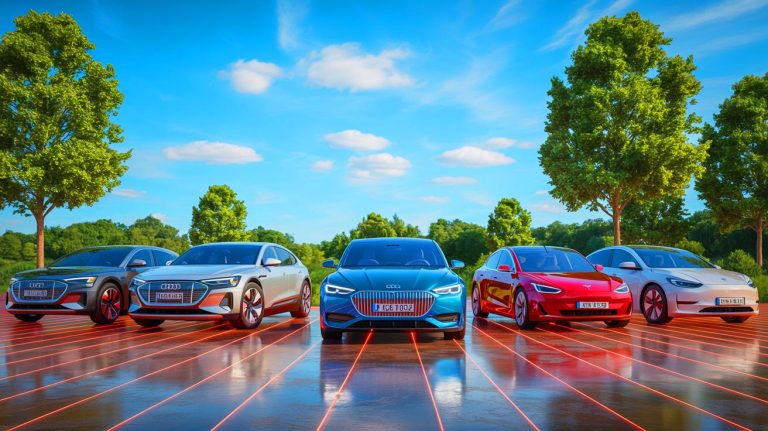| IN A NUTSHELL |
|
Electric vehicles (EVs) are often seen as the future of transportation, but they face unique challenges, especially during hot summer months. High temperatures can significantly impact their range, a concern for drivers planning long journeys. Recent findings by Recurrent Auto, a platform focused on EV performance, shed light on which electric car models maintain their autonomy even as the mercury rises. The study analyzed data from nearly 30,000 EVs to distinguish the top performers from those that struggle, offering valuable insights for both current and potential EV owners.
Impact of Temperature on EV Autonomy
Recurrent Auto’s research highlights that the effect of heat on EV range varies significantly with temperature changes. At 90°F (32°C), the drop in autonomy is minimal, typically under 5%. This reduction is mainly due to the increased use of air conditioning. However, once temperatures reach 100°F (37°C), the decline becomes more pronounced, with range dropping by 17 to 18%. This temporary decrease occurs as the vehicle’s cooling systems work harder to stabilize the battery and internal temperature.
The study emphasizes that although this autonomy reduction is temporary, it can pose challenges during extended trips. Recurrent Auto advises EV owners to avoid leaving their vehicles with a low charge in extreme heat. EVs utilize their batteries to power cooling systems, which can further drain the battery if not adequately charged. Therefore, keeping the vehicle cooled and charged is crucial for maintaining optimal performance.
Top EV Performers in Hot Conditions
Some electric vehicles stand out for their resilience in high temperatures, according to Recurrent Auto’s analysis. The Audi e-tron, BMW i4, and Rivian R1S are noted for their impressive performance, with a range loss of less than 3% even at 100°F. These models exemplify how advanced engineering can mitigate the effects of external heat on battery performance. Meanwhile, the Hyundai IONIQ 5 and Rivian R1T also fare well, maintaining a range loss around 3%.
Other popular models, such as the Mustang Mach-E, Tesla Model 3, and VW ID.4, experience a slightly higher range reduction of 4-5%. These figures indicate that while some vehicles are better equipped to handle heat, most modern EVs are relatively reliable in hot climates. It’s crucial for potential buyers to consider these differences, especially if they frequently travel in areas with extreme temperatures.
Challenges for Certain EV Models
Despite advancements, some EVs still face significant challenges in hot weather. The Tesla Model S, Kia Niro EV, and Chevrolet Blazer EV are among the models that experience a more substantial decrease in range, with reductions of 9%, 12%, and 14% respectively at 90°F. While these losses are temporary, they can be inconvenient, particularly on long drives where charging options may be limited.
For those driving these models, it’s recommended to keep the vehicle cool and ensure the battery remains charged between 50% and 80%. This practice helps maintain battery health and ensures the vehicle is ready for unexpected temperature spikes. Recognizing these limitations is essential for drivers, especially during planning and preparation for trips in hot weather.
Extreme Heat Waves Are Rising—and We’re Still Underestimating the Danger
Practical Tips for EV Owners in Hot Weather
To optimize EV performance during heatwaves, owners should adopt several practical strategies. Pre-cooling the vehicle while it’s still plugged in can conserve battery power by utilizing external electricity for temperature regulation. Additionally, parking in shaded areas or using sunshades can minimize heat exposure, further preserving battery life.
Another vital practice is maintaining a consistent charging routine, ensuring the battery is sufficiently charged before embarking on long journeys. By keeping the charge level between 50% and 80%, drivers can mitigate the risk of heat-related range loss. These proactive measures not only enhance the driving experience but also extend the longevity of the vehicle’s battery.
As electric vehicles continue to evolve, understanding how they perform under various environmental conditions becomes increasingly important. The insights provided by Recurrent Auto offer valuable guidance for both current EV owners and those considering a purchase. As technology advances, one might wonder: How will future innovations further enhance EV resilience against the challenges posed by extreme weather conditions?
Did you like it? 4.5/5 (22)







Wow, less than 3% range loss? That’s impressive! 🚗
Does anyone know if these findings apply to older EV models too?
Finally, some good news for us EV owners in Arizona!
Pre-cooling the vehicle seems like a smart idea, but what if I’m in a hurry?
Can someone explain why the Tesla Model S has such a high range reduction in heat?
I love my Rivian R1S! It’s great to know it’s a top performer in the heat. 😎